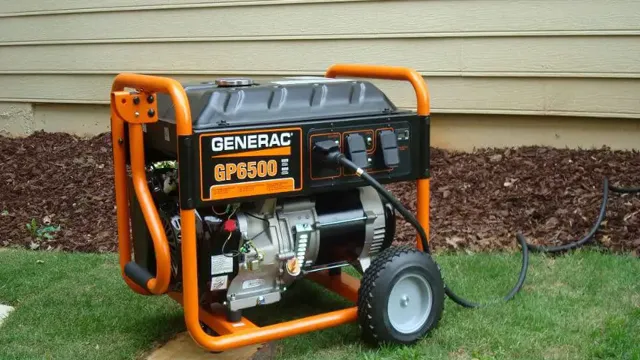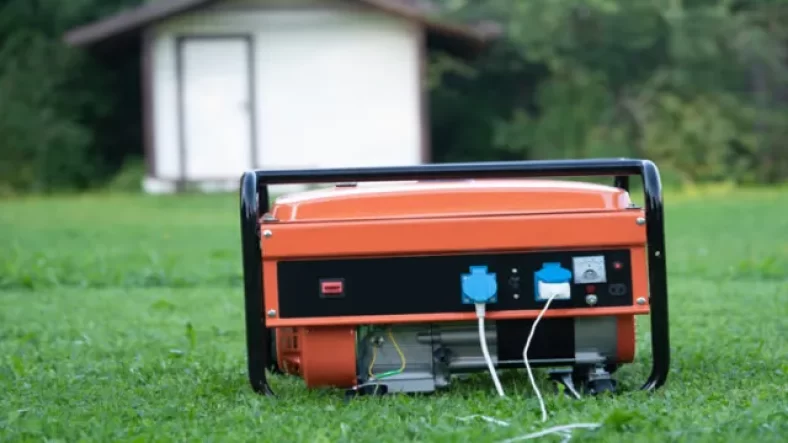Do you live in an area prone to power outages, or maybe just want some backup power for peace of mind? If so, a standby generator is a great option. But how long can a standby generator run continuously? The answer to that question depends on several factors, such as the size of the generator and the amount of fuel it has. In this blog post, we’ll dive into the specifics and help you understand what you can expect from your standby generator.
So, sit back, relax, and let’s get started!
Factors That Affect Generator Runtime
If you own a standby generator, you may be wondering how long it can run continuously in case of a power outage. Several factors affect the generator’s runtime, and it’s essential to understand them to ensure your generator can serve you as expected. The generator’s fuel source plays a vital role in determining its runtime.
A generator that runs on gasoline could typically run for around eight hours, while diesel generators could last up to 24 hours or more. The generator’s size and power output also affect its runtime, with larger generators running for more extended periods than smaller ones. Finally, the load on the generator plays a role in determining how long it can run.
The more appliances and devices hooked up to the generator, the shorter its runtime. Therefore, to ensure your standby generator runs continuously for an optimal time, consider investing in the right fuel type, size and minimize the load as much as possible to avoid overworking the generator.
Fuel Type and Tank Size
When it comes to generator runtime, there are a few key factors that come into play. One major factor is the type of fuel the generator runs on and the size of its tank. Generators can run on gasoline, diesel, or propane, and each of these fuels has its own unique characteristics that can affect how long the generator will run before needing a refill.
Larger tanks, of course, will allow for longer runtimes, but it’s important to keep in mind that running a generator for too long can also put a strain on its engine and other components. Ultimately, the key is to find a balance between fuel efficiency and overall runtime, based on your specific needs. So, if you want to make sure you have reliable power during an outage or other emergency situation, take the time to research fuel types and tank sizes before investing in a generator.

Generator Size and Power Output
Generator size and power output are crucial factors to consider when dealing with generator runtime. The size of a generator determines how much power it can generate. A larger generator will typically produce more power, while a smaller generator will produce less.
However, the power output isn’t the only factor to take into account. Several factors can affect the runtime of a generator, such as fuel type, engine efficiency, load capacity, and weather conditions. For instance, a generator running on natural gas may have a longer runtime than a diesel generator since natural gas burns cleaner and is more efficient.
Similarly, a generator running with a smaller load capacity will typically run longer than a generator that’s overloaded. Additionally, the weather is also a crucial consideration since a generator may not work correctly or may work harder to generate power in extreme weather conditions such as extreme heat or cold. Therefore, it’s essential to consider all of these factors when choosing a generator to ensure that it meets your power needs and can run efficiently for an extended period.
Temperature and Altitude
Generator Runtime When it comes to generator runtime, there are several factors that can affect it, including temperature and altitude. Temperature can have a significant impact on how long a generator can run at full capacity. In hotter temperatures, the generator’s engine may overheat, and its performance can be severely affected.
On the other hand, cold temperatures can cause the oil and fuel to thicken, making it more challenging for the generator to start. Altitude is an equally crucial factor that can impact the runtime of a generator. As the altitude increases, the air pressure decreases, which can affect the generator’s combustion and cause it to run less efficiently.
It is crucial to consider these factors when choosing a generator and deciding on its location to ensure that it runs smoothly and provides reliable power when it is needed the most.
Average Runtime of Standby Generators
If you’ve invested in a standby generator to keep your home or business running during power outages, you may be wondering how long it can run continuously. The truth is, the average runtime of a standby generator depends on several factors, such as the size of the generator, the fuel type, and the load it’s powering. However, most standby generators can run for anywhere from 24 to 72 hours without interruption, assuming they are properly sized and maintained.
It’s important to note that running a generator continuously without rest can lead to mechanical failure and other issues, so it’s recommended that you have a licensed professional install and maintain your generator to ensure it’s running optimally. Additionally, it’s a good idea to have a backup plan in case your generator runs out of fuel or experiences any other issues during an extended power outage.
Residential Generators
Residential generators are an important investment for homeowners who want to keep their homes powered during power outages. One important factor to consider when choosing a generator is its average runtime. This refers to the amount of time the generator can run before needing to be refueled.
The average runtime of standby generators can vary depending on the size and capacity of the generator, as well as the type of fuel it uses. On average, however, most generators can run for approximately 24-48 hours on a full tank of fuel. Some models may have longer runtimes, while others may have shorter runtimes.
It’s important to consider your specific needs and the likelihood of extended power outages when choosing a generator with an appropriate runtime. Overall, a residential generator with a sufficient runtime can provide peace of mind and convenience during power outages.
Commercial Generators
If you own a commercial generator, one of the most important things to consider is its average runtime. On average, a standby generator can run for up to 2000 hours or around 83 days. However, this greatly depends on a variety of factors such as the size of the generator, its fuel capacity, and how often it’s used.
Larger generators with bigger fuel tanks can run for longer periods of time without the need for refueling. Meanwhile, generators that are used frequently or in extreme weather conditions may have shorter runtimes due to increased wear and tear. To make sure your generator stays in top condition and continues to provide reliable power during an emergency, it’s essential to perform regular maintenance and have it serviced by a professional technician.
By doing so, you can extend the lifespan of your generator and ensure it’s always ready to provide backup power when you need it most.
Increasing Generator Runtime
Have you ever wondered how long a standby generator can run continuously? Well, it all depends on the size of the generator and the fuel it requires. The larger the generator, the longer it can run. Also, diesel generators run longer than gasoline generators as diesel fuel is more efficient.
Typically, generators are designed to run for a maximum of 24-48 hours continuously, depending on the load. However, increasing the runtime of a standby generator is possible with some necessary steps. Regular maintenance and keeping the fuel tanks full are crucial.
The generator needs to be shut down for a brief period for maintenance, such as changing the oil, cleaning the filters, and replacing spark plugs. Also, it is essential to schedule weekly or monthly exercises to prevent the generator from malfunctioning during an emergency. In summary, standby generators can run continuously for 24-48 hours and can be increased by proper maintenance and fuel management.
Regular Maintenance and Inspections
Regular maintenance and inspections are crucial for increasing generator runtime. Just like any other machinery, generators also require regular maintenance and inspections to function optimally. By conducting regular checks, you can detect any potential issues before they become significant problems.
Inspections can help you identify any wear and tear in the generator’s components, such as filters, coolant, and oil. Regular maintenance can ensure that all parts are functioning correctly, and any needed repairs are addressed immediately. Proper servicing can also help increase the generator’s efficiency, which translates to longer runtimes.
Neglecting regular maintenance and inspections can lead to sudden breakdowns, increased repair costs, and reduced generator lifespan. By prioritizing regular maintenance and inspections, you can guarantee that your generator is ready to operate in any circumstances.
Fuel Management and Conservation Strategies
One of the most effective ways to conserve fuel and increase the runtime of a generator is by implementing practical strategies. For example, it’s essential to regularly service and maintain the generator to ensure proper functioning. Keeping the generator well-oiled and clean can increase its efficiency and ultimately reduce fuel consumption.
Secondly, running the generator off-peak hours or during periods of low demand can significantly reduce the need for frequent refuelling, and therefore conserve fuel. Additionally, it’s wise to monitor the fuel levels regularly, as running the generator to low fuel levels can result in wasted fuel. Finally, investing in energy-efficient machinery or appliances that consume less power can significantly increase the runtime of the generator, further conserving fuel.
By implementing these fuel management and conservation strategies, one can ensure that their generator runs efficiently, saving both time and money in the long run.
Conclusion
In answer to the question of how long a standby generator can run continuously, it ultimately depends on the specific make and model. However, it’s important to remember that the true mark of a generator’s longevity isn’t necessarily in how long it can run uninterrupted, but in how consistently it can provide reliable power when it’s needed most. So whether you’re preparing for a short-term outage or a more prolonged emergency, investing in a reliable standby generator is a smart decision that can provide peace of mind no matter how long the power may be out.
“
FAQs
What is a standby generator and how does it work?
A standby generator is a backup power source that automatically turns on when the main power supply fails. It is connected to your home’s electrical system and runs on either natural gas or propane. When the power goes out, the standby generator starts up and provides electricity to power your essential appliances and devices.
How long can a standby generator run continuously?
The length of time a standby generator can run continuously depends on the size of the generator and the amount of fuel it has. Most standby generators can run for 24 to 48 hours without needing to be refueled. However, larger generators with larger fuel tanks can run for several days without interruption.
How often should I service my standby generator?
It is recommended that you service your standby generator once a year to ensure that it is in good working order. This includes checking the oil level, air filter, spark plugs, and battery. Regular maintenance will help prevent breakdowns and ensure that your generator is ready to use when you need it.
Can a standby generator be used to power my entire home?
A standby generator can be used to power your entire home, but it depends on the size of the generator and the electrical load of your home. It is important to consult with a licensed electrician or generator installer to determine the appropriate size generator for your home’s needs. In some cases, you may need to prioritize essential appliances and devices to ensure that your generator is not overloaded.


